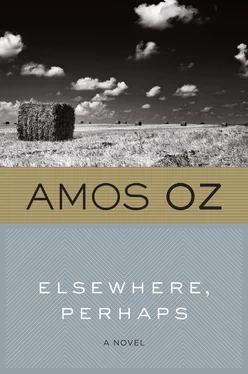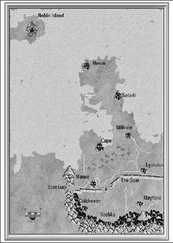Amos Oz - Elsewhere, Perhaps
Здесь есть возможность читать онлайн «Amos Oz - Elsewhere, Perhaps» весь текст электронной книги совершенно бесплатно (целиком полную версию без сокращений). В некоторых случаях можно слушать аудио, скачать через торрент в формате fb2 и присутствует краткое содержание. Год выпуска: 1985, Издательство: Mariner Books, Жанр: Современная проза, на английском языке. Описание произведения, (предисловие) а так же отзывы посетителей доступны на портале библиотеки ЛибКат.
- Название:Elsewhere, Perhaps
- Автор:
- Издательство:Mariner Books
- Жанр:
- Год:1985
- ISBN:нет данных
- Рейтинг книги:4 / 5. Голосов: 1
-
Избранное:Добавить в избранное
- Отзывы:
-
Ваша оценка:
- 80
- 1
- 2
- 3
- 4
- 5
Elsewhere, Perhaps: краткое содержание, описание и аннотация
Предлагаем к чтению аннотацию, описание, краткое содержание или предисловие (зависит от того, что написал сам автор книги «Elsewhere, Perhaps»). Если вы не нашли необходимую информацию о книге — напишите в комментариях, мы постараемся отыскать её.
Elsewhere, Perhaps — читать онлайн бесплатно полную книгу (весь текст) целиком
Ниже представлен текст книги, разбитый по страницам. Система сохранения места последней прочитанной страницы, позволяет с удобством читать онлайн бесплатно книгу «Elsewhere, Perhaps», без необходимости каждый раз заново искать на чём Вы остановились. Поставьте закладку, и сможете в любой момент перейти на страницу, на которой закончили чтение.
Интервал:
Закладка:
Bronka smiled despite herself, and said:
"You astonish me. You would make a great lawyer. You find it so easy to argue black into white."
"I'm color blind, my dear. Colors just run riot in front of my eyes."
"Everything you say is put so tactfully, and yet behind it all I can sense a terrible rudeness, as if… as if you were filling in an official form."
Zechariah chose to ignore the critical remark. He leaned toward Bronka and picked his words carefully.
"Now for item four. As far as the previous items are concerned, the mission entrusted to me by the mother and the harmful influence of the father, I was only a spokesman. A kind of roving ambassador. But item four concerns me myself. Now, if you will forgive my rather formal preamble, I propose to dispense with formalities and make a personal confession."
Bronka widened her eyes and murmured:
"Yes. Yes."
Zechariah sighed, closed his eyes, reopened one of them, and said:
"A very personal confession. I am, as is well known, a lonely old man. No home, no wife, no children. A few memories of my childhood, a few scars left by my sufferings, that's all my possessions. Who or what have I got in the whole wide world apart from my brother and his family? I came to you to… to pick up a few crumbs of your happiness, a happiness that has never fallen to my lot." (Zechariah's eyes — for the second time that day — filled with tears.) "I came to… to find warmth. To draw some wistful satisfaction from the contentment of my dear brother Ezra. That is why I didn't go to stay with Nehemiah, Bronka, my love: Nehemiah, like me, is a withered tree. So, I came here to pick up some crumbs of happiness. I am a parasite, a creeper clinging to the oaks of the forest. I am no more than what our enemies accuse me of being. But what did I find — to my horror — when I arrived? A tragedy. An appalling tragedy in my brother's family. The last solid rock on which my life was founded, the last mainstay of my crumbling hopes, was being carried away and destroyed. My beloved brother was the victim of a faithless woman, the plaything of a wanton little girl, cast out from the bosom of his family. How could I help being shocked? Was my heart made of stone? So I said to myself, you, who have never had a home, who will never have a home, if you can manage to restore the ruins of this one home you will be able to say on your dying day: I have not lived in vain. I may have been a rotting tree, but my decay enriched the lives of others. What I mean is — forgive my rhetoric, emotion is blocking my throat — what I mean is, I undertook — without asking your permission — to do whatever lay in my power for you. For many nights I thought the matter over I came to the conclusion that if I could only persuade the complex-ridden little creature to quit my brother's life and disappear from here for ever, it would open the way for a reconciliation between husband and wife. Then, and only then, Uncle Zechariah could pack his bags and leave behind him a job well done. He would not expect any gratitude. He would go back out into the cold dark night. But deep down in his heart he would carry with him wherever he went a secret pride, a worthwhile reward for all his labors. Was that a sin? Did I do wrong, dear Bronka? I was only trying to help you….To rid you of the little hussy. To take away with me the abscess that is poisoning your lives and your happiness. And also to teach the errant wife a lesson, so that she would always be faithful to my brother. Besides — I openly admit it — gratifying my modest pride. Was that a sin?"
And as he spoke, Siegfried went down on his knees before Bronka, just as he had done a few hours previously to Noga, and his face was tear-stained.
Bronka whispered:
"I don't understand it at all. I'm afraid of you. You're strange. You're slv."
Siegfried groaned desperately.
"Don't try to understand, Bronka, don't try to understand, it's not understanding that's needed, it's feeling. You're right. I must go. But not alone. I must take little Eva with me. For your sake, Bronka. For my brother's sake. For Oren's sake. For Noga's sake. For Eva's sake."
Suddenly, in a vehement outburst, he added:
"Will you help me? Will you help me?"
And without waiting for her answer, he compulsively pushed her toward the door, bowed a servile bow, smirked, sobbed, declared that this time he had truly revealed all his secrets, pleaded once again for Bronka's sympathy, and slammed the door shut behind her.
Bronka went out into the night with a heavy heart. She tried to control herself and put her thoughts in order. She was still convinced that the man was a scoundrel and a clown. And yet, as she reached that conclusion, she had a feeling that her judgment was somehow unfair to him.
That feeling, like all her other feelings at that moment, was sharoly defined.
Zechariah threw himself down on his bed, drew a small flask out from under his mattress, and took a few swigs. Then he sneezed twice. Then he slowly perused a German magazine. And after that, unbelievable though it may seem, he cried.
32. COME, LET'S GO
From Reuven Harish's last poem:
When far to West the crimson sun has set
And night falls swiftly, like a sudden blow,
When heart is tired of pleading, "No, not yet,"
Then sounds an ice-blue whisper: Come, let's go.
33. DIM IN THE NIGHT
Dim in the night comes the sound of enemy soldiers singing on the slopes of the mountain. Round their fortified positions they have lit small camp fires. Their faint undulating song comes down off the mountain to howl outside our windows.
Wistful yearning fills the night. The points of fire hover in the sky, since darkness hides the mountain range from sight. They may be singing With joy, but the night tends to distort the sound and fill it with simmering sadness.
What are they plotting? Autumn is near. Every morning white-robed workmen gather there to dig trenches and build concrete defenses. An officer stands over them holding what looks like a thin stick. Fragments of his orders make their way down to us. Deep pits are dug at the edge of the Camel's Field. The heaps of fresh-dug earth mount day by day. Pickaxes clang against rock. A constant procession of clumsy flat trucks, with a lively, arrogant jeep darting in and out. Soldiers with steel helmets watch us every hour of the day and study all our movements. The squat fellahin who used to work the Camel's Field are no more to be seen. Grisha Isarov's juicy curses meet with no response. Their men seem to be under new, stricter orders. At times their slender jet planes appear and fly low over the mountain. They steer clear of the sky above our valley. High above the roof tops of our little bungalows our own planes flash in pairs.
Eight days before the New Year festival a military patrol set out at twilight along one of the forsaken tracks, right under the noses of the enemy positions. We can hardly deny that this was intended to tempt them into an early engagement. In our defense we can say that the patrol did not cross the disputed line. The time was carefully chosen so that the setting sun would be shining straight into their eyes. Before the patrol set out we were instructed to take the children down into the underground shelters. But the operation passed without incident. The enemy let the patrol pass within a stone's throw without firing a shot. What were they plotting? We, for our part, if we may be forgiven, experienced a thrill of anticipation. Something was about to happen. The rhythm of our lives was about to change.
True, there were those among us who were not free from pangs of sadness. Ido Zohar, for example. Ido climbed, alone, to the observation post at the top of the water tower. There he found a filthy old mattress with its innards spilling out. The boy lay flat on his back and looked up at the slight late-summer clouds. From time to time he addressed himself to them. He had a question to ask. But why should late-summer clouds linger to listen to a dreamy youth? The clouds eye him and pass silently on their way. They seem not to be moving, in the absence of a wind. But a closer examination reveals their secret. In reality they are slowly drifting eastward, and others take their place. These, too, are at the mercy of powerful forces. They have no fixed shape. Are they the ghosts of primeval monsters? Which is the most subtle of the beasts of the field? For whom does the autumn speak? And what is the mission of the birds?
Читать дальшеИнтервал:
Закладка:
Похожие книги на «Elsewhere, Perhaps»
Представляем Вашему вниманию похожие книги на «Elsewhere, Perhaps» списком для выбора. Мы отобрали схожую по названию и смыслу литературу в надежде предоставить читателям больше вариантов отыскать новые, интересные, ещё непрочитанные произведения.
Обсуждение, отзывы о книге «Elsewhere, Perhaps» и просто собственные мнения читателей. Оставьте ваши комментарии, напишите, что Вы думаете о произведении, его смысле или главных героях. Укажите что конкретно понравилось, а что нет, и почему Вы так считаете.












